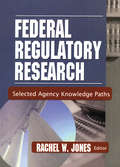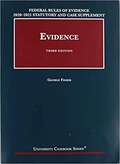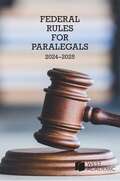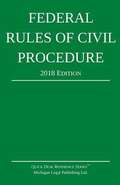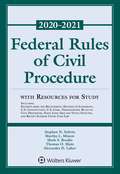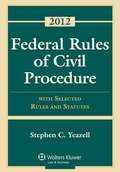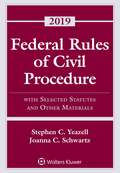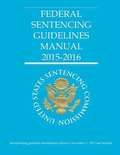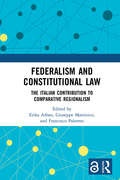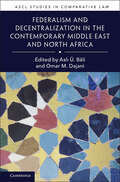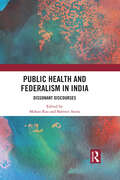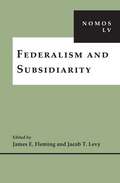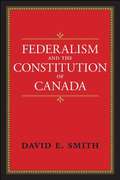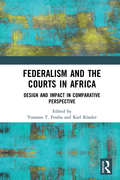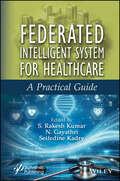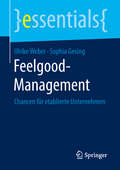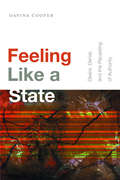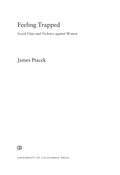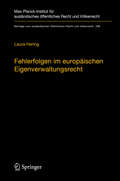- Table View
- List View
Federal Regulatory Research: Selected Agency Knowledge Paths
by Rachel JonesProvide your patrons with shortcuts to the legal research resources they need! Federal Regulatory Research: Selected Agency Knowledge Paths presents sample pathfinders to help law librarians access and navigate the labyrinth of federal agency laws, regulations, interpretative releases, memoranda, and dockets. These "knowledge paths" represent the input of government, academic, and private law firm librarians with varied patron bases and institutional missions. The book provides access information to a wealth of quality sources, saving you the time-and trouble-of searching through endless hours of print and electronic resources. Federal Regulatory Research: Selected Agency Knowledge Paths identifies, describes, evaluates and locates the resources that busy attorneys and law students need to develop an organized approach to legal research. The book's contributors detail information found within a given resource (indexes, abstracts, catalogs), discussing entry and update factors that provide specific avenues of research, including: the United States Department of Education the United States Environmental Protection Agency the Federal Reserve System the Federal Trade Commission the United States Patent and Trademark Office the Federal Deposit Insurance Corporation and much more! Federal Regulatory Research: Selected Agency Knowledge Paths is a vital resource for law librarians in their quest to provide patrons with research guidance on legal and regulatory subjects.
Federal Reports on Police Killings: Ferguson, Cleveland, Baltimore, and Chicago
by U.S. Department of JusticeFederal Reports on Police Killings: Ferguson, Cleveland, and Baltimore, the complete reports from the Department of Justice's landmark investigations of police violence in three major American cities.This collection opens with the brief Department of Justice statement about the decision to close the investigation into the death of Trayvon Martin in 2012 --- an event that animated the Black Lives Matter movement and can be interpreted as a catalyst for the DOJ's inquiries into law enforcement. The reports that followed speak for themselves.
Federal Rules Of Evidence 2020-21 Statutory And Case Supplement To Fisher's Evidence, 3d (University Casebook Series)
by George FisherThis statutory and case supplement incorporates the latest statutory changes and proposed revisions and the most recent U.S. Supreme Court decisions bearing on evidence law. <P><P> The statutory component incorporates a 2019 amendment of Rule 807, together with a new Advisory Committee Note. Also included is a proposed amendment of Rule 404(b)'s notice requirement, revised after public comments and on course to become law on December 1, 2020. The Advisory Committee’s Note to the proposed change appears along with explanatory editor’s notes. <P><P> The statutory component presents a side-by-side reprinting of the older (pre-2011), unrestyled Federal Rules of Evidence and the newly restyled rules to allow for ready comparison. Editor’s notes point out those areas where the restyling project, contrary to its authors’ claimed intentions, worked substantive changes to the rules. The case supplement analyzes the Supreme Court’s 2017 decision in Peña-Rodriguez v. Colorado, in which the Court ruled that the Sixth Amendment’s guarantee of an impartial jury overcomes Rule 606(b) and its state-law analogues and permits defendants to present juror testimony about certain expressions of ethnic or racial bias in the jury room. The supplement addresses the Court’s related 2014 ruling in Warger v. Shauers as well as its 2015 decision in Ohio v. Clark and 2013 ruling in Salinas v. Texas. Clark addressed whether the admission against the defendant of a young child’s allegation of abuse, made out of court and offered in lieu of the child’s testimony at trial, violated the defendant’s confrontation right. And Salinas examined the prosecution’s use in its case-in-chief of a suspect’s silence in response to noncustodial police questioning. Throughout the supplement, those who teach with Fisher’s Evidence (3d ed. 2013) will benefit from paginated cross-references between the casebook and the supplement.
Federal Rules for Paralegals
by West AcademicFederal Rules for Paralegals includes: Federal Rules of Civil Procedure, Federal Rules of Evidence, Federal Rules of Appellate Procedure; United States Constitution
Federal Rules of Civil Procedure (Quick Desk Reference Series™)
by Michigan Legal Publishing Ltd.A concise and comprehensive edition of the Federal Rules of Civil Procedure and related supplementary statutes for quick reference. Updated through January 1, 2018. Perfect for your briefcase or desk and a great format for the attorney or law school student who simply needs to refer to the rules.
Federal Rules of Civil Procedure with Resources for Study 2020-2021 (Supplements Series)
by Mark S. Brodin Stephen N. Subrin Martha L. Minow Thomas O. Main Alexandra D. LahavThis book is a resource to supplement any civil procedure course. In addition to the usual fare of Federal Rules, Committee Notes, the U.S. Constitution, and U.S. Code provisions, this supplement includes examples of state long-arm and venue statutes, as well as excerpts from the Restatement (Second) of Judgments, and excerpts from the American Law Institute/UNIDROIT Rules of Transnational Civil Procedure. This supplement has been integrated into the text of the Federal Rules useful cross-references to relevant external materials--Forms, Advisory Committee Notes, Restatement sections, and Transnational Rules. These cross-references appear with the designation: "For further study, see." This cross-referencing method will help students explore the larger context of each Federal Rule without having to significantly interrupt the presentation of the Federal Rules themselves.
Federal Rules of Civil Procedure: With Selected Rules and Statutes -- 2012
by Stephen C. YeazellThe federal procedural system flows from four major sources of law: (1) the Constitution of the United States, (2) the Federal Rules (of Civil and Appellate Procedure), (3) the Judiciary Code (collected in Title 28 of the United States Code), and (4) cases applying and interpreting these three bodies of law. This supplement contains examples of all four sources: the first three in Part I and case law in Part II. This volume is intended to serve as a rules supplement for any-civil procedure course. The statutes and rules reflect amendments through January 31, 2012. I am grateful for the help of Lucas Hori in preparing this supplement.
Federal Rules of Civil Procedure: With Selected Statutes and Other Materials 2019 (Supplements Ser.)
by Stephen Yeazell Joanna SchwartzFederal Rules of Civil Procedure: With Selected Statutes and Other Materials, 2019
Federal Sentencing Guidelines Manual 2015-2016
by United States Sentencing CommissionThis edition of the Guidelines Manual reflects amendments including: Changes to the fraud guideline involving victims and individual culpability; Adjustment to the monetary tables to account for inflation; New marijuana equivalency for hydrocodone based on weight alone; and, Additional guidance for the application of mitigating role adjustment.
Federal Taxation of Corporations and Shareholders
by Boris I. Bittker James S. EusticeOriginally published: Hamden, Conn.: Federal Tax Press, 1959.
Federal Trade Commission Privacy Law and Policy
by Chris Jay HoofnagleThe Federal Trade Commission, a US agency created in 1914 to police the problem of 'bigness', has evolved into the most important regulator of information privacy - and thus innovation policy - in the world. Its policies profoundly affect business practices and serve to regulate most of the consumer economy. In short, it now regulates our technological future. Despite its stature, however, the agency is often poorly understood by observers and even those who practice before it. This volume by Chris Jay Hoofnagle - an internationally recognized scholar with more than fifteen years of experience interacting with the FTC - is designed to redress this confusion by explaining how the FTC arrived at its current position of power. It will be essential reading for lawyers, legal academics, political scientists, historians and anyone else interested in understanding the FTC's privacy activities and how they fit in the context of the agency's broader consumer protection mission.
Federalism and Constitutional Law: The Italian Contribution to Comparative Regionalism
by Erika ArbanThis volume examines the relationship between central government and local institutions, taking Italy as a case study to present a comparative perspective on how the Italian experience has influenced the global developments of federal and regional states. As the country with the longest standing regional system, Italy has a lot to tell countries that are dealing with similar issues in present times. Adopting a theoretical/analytical approach coupled with comparative analysis, this volume critically reflects on the changes brought to the Italian system of government by the reform of Title V of the Italian constitution, the reasons why further decentralisation has been resisted and offers a comparative overview of the place and contributions that the Italian experience has brought to the global debate on regionalism and federalism. The book is divided into two parts: Part I distils the essence of the evolution of Italian regionalism and the respective debate before and after 2001. While focusing on Italy, the various chapters situate it within the global framework of discussion. Part II reflects on how the Italian regional constitutional architecture contributes to the global debate, particularly focusing on the main innovations brought about by constitutional reform. The book will be essential reading for researchers, academics and policy-makers working in the areas of constitutional law and politics, and federalism.
Federalism and Decentralization in the Contemporary Middle East and North Africa (ASCL Studies in Comparative Law)
by Aslı Ü. Bâli Omar M. DajaniThis volume, the first of its kind in the English language, examines the law and politics of federalism and decentralization in the Middle East and North Africa. Comprised of eleven case studies examining the experience across the region, together with essays by leading scholars providing comparative and theoretical perspectives and a synthetic conclusion by the co-editors, the volume offers a textured portrait of the dilemmas of decentralization during a period of sweeping transition in the region. The collection addresses an important gap in the comparative decentralization literature, which has largely neglected the MENA region. Both retrospective and forward-looking in orientation, the book is a valuable resource not only for scholars of comparative politics, constitutional design, and Middle East studies, but also for policy makers evaluating the feasibility and efficacy of decentralization as a vehicle for improving governance and responding to identity conflict in any part of the world.
Federalism and Public Health in India: Dissonant Discourses
by Balveer Arora Mohan RaoThe interface of public health and federalism are increasingly gaining scholarly attention in the fields of comparative federalism and welfare state studies. This volume looks into various facets of public health and governance in India from a legal, institutional and policy perspective.The volume explores the regulatory architecture around healthcare in federal systems of governance; public finance and insurance; private sector in medical care and the tussle for power between the union and the states. A multidisciplinary volume with essays from scholars working in public health, economics, political science and legal studies, the book critically evaluates India’s public policy apparatus dealing with health crises, inequity and the lack of health infrastructure and resources among other challenges. It also looks at the impact of the Covid-19 pandemic on federalism and democratic structures as well as the role of institutions such as the NITI Aayog and other central agencies in policy formulation and implementation within the broader framework of intergovernmental relations in a federal system.The book will be of interest to students and researchers of public health, public policy, health administration, medical sociology, constitutional law and political science, as well as of federalism.
Federalism and Subsidiarity: NOMOS LV (NOMOS - American Society for Political and Legal Philosophy #21)
by James E. Fleming Jacob T. LevyIn Federalism and Subsidiarity, a distinguished interdisciplinary group of scholars in political science, law, and philosophy address the application and interaction of the concept of federalism within law and government. What are the best justifications for and conceptions of federalism? What are the most useful criteria for deciding what powers should be allocated to national governments and what powers reserved to state or provincial governments? What are the implications of the principle of subsidiarity for such questions? What should be the constitutional standing of cities in federations? Do we need to “remap” federalism to reckon with the emergence of translocal and transnational organizations with porous boundaries that are not reflected in traditional jurisdictional conceptions? Examining these questions and more, this latest installation in the NOMOS series sheds new light on the allocation of power within federations.
Federalism and the Constitution of Canada
by David E. SmithThe Canadian system of federalism divides the power to govern between the central federal parliament and the provincial and territorial legislative assemblies. In what can be seen as a double federation, power is also divided culturally, between English and French Canada. The divisions of power and responsibility, however, have not remained static since 1867. The federal language regime (1969), for example, reconfigured cultural federalism, generating constitutional tension as governments sought to make institutions more representative of the country's diversity.In Federalism and the Constitution of Canada, award-winning author David E. Smith examines a series of royal commission and task force inquiries, a succession of federal-provincial conferences, and the competing and controversial terms of the Constitution Act of 1982 in order to evaluate both the popular and governmental understanding of federalism. In the process, Smith uncovers the reasons constitutional agreement has historically proved difficult to reach and argues that Canadian federalism 'in practice' has been more successful at accommodating foundational change than may be immediately apparent.
Federalism and the Courts in Africa: Design and Impact in Comparative Perspective
by Karl Kössler Yonatan T. FesshaThis volume examines the design and impact of courts in African federal systems from a comparative perspective. Recent developments indicate that the previously stymied idea of federalism is now being revived in the constitutional arrangements of several African countries. A number of them jumped on the bandwagon of federalism in the early 1990s because it came to be seen as a means to facilitate development, to counter the concentration of power in a single governmental actor and to manage communal tensions. An important part of the move towards federalism is the establishment of courts that are empowered to umpire intergovernmental disputes. This edited volume brings together contributions that first discuss questions of design by focusing, in particular, on the organization of the judiciary and the appointment of judges in African federal systems. They then examine whether courts have had a rather centralizing or decentralizing impact on the operation of African federal systems. The book will be of interest to researchers and policy-makers in the areas of comparative constitutional law and comparative politics.
Federated Intelligent System for Healthcare: A Practical Guide
by Seifedine Kadry N. Gayathri S. Rakesh KumarThis practical guide gives valuable insights for integrating advanced technologies in healthcare, empowering researchers to effectively navigate and implement federated systems to enhance patient care. Federated Intelligent Systems for Healthcare: A Practical Guide explores the integration of federated learning and intelligent systems within the healthcare domain. This volume provides an in-depth understanding of how federated systems enhance healthcare practices, detailing their principles, technologies, challenges, and opportunities. Additionally, this book addresses secure and privacy-preserving sharing of medical data, applications of artificial intelligence and machine learning in healthcare, and ethical considerations surrounding the adoption of these advanced technologies. With a focus on practical implementation and real-world use cases, Federated Intelligent Systems for Healthcare: A Practical Guide equips healthcare professionals, researchers, and technology experts with the knowledge needed to navigate the complexities of federated intelligent systems in healthcare and harness their potential to transform patient care and medical advancements. Readers will find the book: Provides cutting-edge research from industry experts to unlock the future of healthcare with innovative insights that embrace federated intelligence and shape the future; Presents novel technologies and conceptual and visionary-based scenarios; Discusses real-world case studies and implementations that illustrate how federated intelligence is practically applied across various healthcare scenarios, from personalized diagnostics to population-level insights; Stands as a pioneer in the exploration of federated intelligent systems in healthcare. Audience Data scientists, IT, healthcare and business professionals working towards innovations in the healthcare sector. The book will be especially helpful to students and educators.
Feeding Frenzy: Attack Journalism and American Politics
by Larry J. SabatoThe author presents the phenomenon of "attack journalism." In describing "attack journalism," he exposes the harm done by the media to politicians and the harm done to the journalistic profession itself. The author examines the origins of feeding frenzies and gives lessons and possible remedies.
Feeding the World Well: A Framework for Ethical Food Systems
by Alan M. GoldbergLeading experts reveal ways that the future of food production for the world's burgeoning population can (and must) be both sustainable and ethical.In the United States, food is abundant and cheap but loaded with hidden costs to the environment, human health, animal welfare, and the people who work in our food systems. The country's current food production systems lack diversity in crops and animals and are intensified but not sustainable, inhumane in the treatment of animals, and inconsiderate of labor. In order to feed the world's rapidly growing population with high-quality, ethically produced food, new food production systems are urgently needed. These new systems must be genetically diverse and environmentally sustainable, and they need to follow internationally recognized animal welfare and labor practices.Feeding the World Well examines these costs of cheap food while presenting a unique framework for ethical food systems: the Core Ethical Commitments, which are designed to guide consumers in choosing foods that are aligned with their values while helping producers enhance the ethics of their practices and products. Edited by Alan M. Goldberg, the volume features contributions from leading ethicists and food systems experts. Addressing complex issues such as climate change, worker exploitation, obesity, antibiotic resistance, wasted food, and biotechnology, the book discusses the fundamental forces that have shaped, and will continue to shape, our food systems. It also describes some of the approaches that food companies and nonprofit organizations are using to address the ethical challenges facing these food systems. Finally, the book explains what the Core Ethical Commitments are (and what they are not), how they were developed, and how they might be used by food system actors.By bringing together an all-star group of contributors from academia and industry, Feeding the World Well sets a new course for food production and how it is evaluated. By including the voices of industry leaders alongside those of researchers and regulators, the book prepares the food production industry for a world in which "ethical" or "sustainable" production practices are not only trendy but necessary to ensure that we can feed the world's growing population. Conceived as a textbook for food studies courses, this volume will appeal to anyone who is strongly interested in food, including conscious consumers, food industry leaders, researchers, and policy makers.Contributors: Anne Barnhill, Martin W. Bloem, Jonathan Bloom, Nicole M. Civita, Claire Davis, Michiel van Dijk, Adele Douglass, Shauna Downs, Kevin Esvelt, Ruth Faden, Jessica Fanzo, Evan Fraser, Maisie Ganzler, Tara Garnett, Sara Glass, Alan M. Goldberg, Christopher Good, Meredith Kaufman, Gillian Kelleher, Frederick L. Kirschenmann, Herman B. W. M. Koëter, Jennifer Kuzma, Kees van Leeuwen, Robert Martin, Anne E. McBride, Suzanne McMillan, Tom Morley, Marion Nestle, Peter O'Driscoll, Lance B. Price, Marie Luise Rau, Bernard Rollin, Yashar Saghai, Susan A. Schneider, Ellen K. Silbergeld, Paul B. Thompson, Paul Willis, Sylvia Wulf
Feelgood-Management: Chancen für etablierte Unternehmen (essentials)
by Ulrike Weber Sophia GesingDieses essential beschreibt, wie das Konzept des Feelgood-Managements auch für etablierte Unternehmen einen Mehrwert bietet. Ulrike Weber und Sophia Gesing zeigen in dem Folgeband zu „Konzept und Berufsbild des Feelgood-Managements“ die Chancen auf, mit Feelgood-Management organisatorische Agilität zu fördern. Dazu stellen die Autorinnenwerden inhaltliche Gemeinsamkeiten und Unterschiede von Feelgood-Management zu anderen Führungskonzepten wie auch die Schnittstellen und Synergien mit anderen Organisationseinheiten dargestellt. Der Band liefert einen fundierten als auch praxisorientierten Ausblick auf die Chancen von Feelgood-Management in etablierten Unternehmen.
Feeling Like a State: Desire, Denial, and the Recasting of Authority (Global and Insurgent Legalities)
by Davina CooperA transformative progressive politics requires the state's reimagining. But how should the state be reimagined, and what can invigorate this process? In Feeling Like a State, Davina Cooper explores the unexpected contribution a legal drama of withdrawal might make to conceptualizing a more socially just, participative state. In recent years, as gay rights have expanded, some conservative Christians—from charities to guesthouse owners and county clerks—have denied people inclusion, goods, and services because of their sexuality. In turn, liberal public bodies have withdrawn contracts, subsidies, and career progression from withholding conservative Christians. Cooper takes up the discourses and practices expressed in this legal conflict to animate and support an account of the state as heterogeneous, plural, and erotic. Arguing for the urgent need to put new imaginative forms into practice, Cooper examines how dissident and experimental institutional thinking materialize as people assert a democratic readiness to recraft the state.
Feeling Queer Jurisprudence: Injury, Intimacy, Identity (Social Justice)
by Senthorun Sunil RajThis book draws on the analytic and political dimensions of queer, alongside the analytic and political usefulness of reading emotion, to navigate legal interventions aimed at addressing the rights of LGBT people. Scholars, activists, lawyers, and judges concerned with eliminating violence and discrimination against LGBT people have generated passionate conversations about pursuing law reform to make LGBT injuries, intimacies, and identities visible, while some challenge the ways legal systems marginalise queer minorities. Senthorun Sunil Raj contributes to these ongoing conversations by using emotion as an analytic frame to reflect on the ways case law seeks to "progress" the intimacies and identities of LGBT people from positions of injury. This book catalogues a range of cases from Australia, United States, and United Kingdom to unpack how emotion shapes the decriminalisation of homosexuality, hate crime interventions, anti-discrimination measures, refugee protection, and marriage equality. While emotional enactments in pro-LGBT jurisprudence enable new forms of recognition and visibility, they can also work, paradoxically, to cover over queer intimacies and identities. Raj shows that reading jurisprudence through emotions can make space in law to affirm, rather than disavow, intimacies and identities that queer conventional ideas about "LGBT progress", without having to abandon legal pursuits to better protect LGBT people. This book will be of interest to students and scholars of human rights law, gender and sexuality studies, and socio-legal theory.
Feeling Trapped: Social Class and Violence against Women (Gender and Justice #9)
by James PtacekThe relationship between class and intimate violence against women is much misunderstood. While many studies of intimate violence focus on poor and working-class women, few examine the issue comparatively in terms of class privilege and class disadvantage. James Ptacek draws on in-depth interviews with sixty women from wealthy, professional, working-class, and poor communities to investigate how social class shapes both women's experiences of violence and the responses of their communities to this violence. Ptacek's framing of women's victimization as "social entrapment" links private violence to public responses and connects social inequalities to the dilemmas that women face.
Fehlerfolgen im europäischen Eigenverwaltungsrecht: Heilung und Unbeachtlichkeit in rechtsvergleichender Perspektive (Beiträge zum ausländischen öffentlichen Recht und Völkerrecht #286)
by Laura HeringDieses Buch nimmt die derzeitige - sowohl interinstitutionelle als auch wissenschaftliche - Debatte um den Erlass eines europäischen Eigenverwaltungsverfahrensgesetzes zum Anlass, sich mit den in der Diskussion bislang ausgeklammerten Rechtsfiguren der Heilung und Unbeachtlichkeit von Verfahrens- und Formfehlern im europäischen Eigenverwaltungsrecht zu befassen. Dabei analysiert und systematisiert es ausführlich die unionsgerichtliche Rechtsprechung und bettet Heilung und Unbeachtlichkeit in das System des europäischen Primärrechts sowie in die Dogmatik und Funktionen des europäischen Eigenverwaltungs(verfahrens)rechts ein. Ein Rechtsvergleich untersucht ferner, wie ausgewählte mitgliedstaatliche Rechtsordnungen mit der Möglichkeit, Verfahrens- und Formfehlern zu relativieren, umgehen. Mit einem konkreten Vorschlag dazu, wie ein mögliches Gesetz zum allgemeinen europäischen Eigenverwaltungsverfahrensrecht die Heilung und Unbeachtlichkeit von Verfahrens- und Formfehlern kodifizieren könnte, wird die Arbeit beschlossen.
